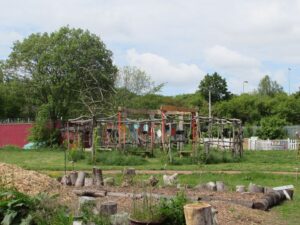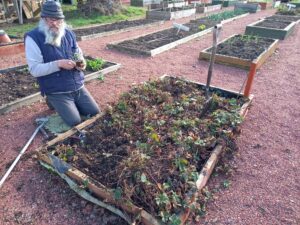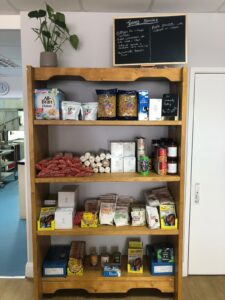From locally grown leeks to outdoor cinemas: How food builds community
A new report by the Food, Farming and Countryside Commission (FFCC) and Local Trust looks at how communities use food to bring people together and create change. To mark its release we spoke to Adam Castleton, project manager at a community garden and café in Westwood and Ravensthorpe.
I grew up playing on the basketball court in Westwood and Ravensthorpe and I can’t remember there being much else in the area even then. Skip forward 20 years and the same run down, unloved basketball court remained the only notable landmark in the area. That is until the WestRaven community café and garden project was established in 2015.
After the £1m grant from Big Local, we held consultations with the community to discuss what we wanted to see in our local area. The two most popular ideas were to set up a community café and a community garden, so this is what we set about doing. We set up a Big Local board and worked with the local housing association, Cross Keys Homes, who are our key partners and acted as our Locally Trusted Organisation (LTO). They employed the staff, created a delivery plan and ran the project.
I joined as project manager about two years in and worked with the local community to decide our areas of focus. These were to support peoples’ physical and mental health and wellbeing, support people with employability, and inspire the next generation.
The school uses the garden every week to teach the kids about growing food.
We were lucky enough to be given a 25-year lease from the local school to use an area of what was wasteland – which we have, over time, turned into a flourishing garden growing a wide array of fruits and vegetables. This food is then cooked in the café and sold to our community. The school uses the garden every week to teach the kids about growing food and at the end of every season they get an opportunity to come in, pick what they have grown and cook soups and pizzas in the outdoor kitchen.
We collect food – food from supermarkets and farms that would have been just thrown into landfill – and give it to the community.
In the café there is a community fridge which is almost always full and which anyone can help themselves to, and a community pantry for which all we ask for is donations. We collect food – food from supermarkets and farms that would have been just thrown into landfill – and give it to the community, so people don’t have to rely on handouts. On the back of this we run cooking classes to teach people how to cook different foods.
This is so much more than a café and garden, though. In terms of facilities, we also have an outdoor roundhouse, built completely by a volunteer, an outdoor cooking area, a classroom, a play area, a herb spiral, a greenhouse and a poly tunnel. And what we are able to achieve here goes far beyond its constituent parts – the community is markedly different. The crime rate has gone down – tangible proof of the good WestRaven is having on the wider community – and people who would otherwise have nowhere to go are now volunteers, working in the café and participating in workshops.
Thanks to our incredible staff and volunteers in the café and garden, we were even able to continue to run during the Covid lockdowns. We were able to supply and deliver hundreds of free food parcels to anyone who needed it.
Thanks to our incredible staff and volunteers in the café and garden, we were even able to continue to run during the Covid lockdowns, where many of the local community centres and groups we work with were forced to essentially shut up shop for a year. In that time, we were able to supply and deliver hundreds of free food parcels to anyone who needed it. One of our key strengths is how we work together as a team and how flexible and reactive we can be. Of course, it is important to have a strong plan when it comes to this kind of community work, but without the ability to be reactive to what the community needs, we would not have been able to adapt our whole model practically over night to address the crisis caused Covid.
“I have lived in Westwood and Ravensthorpe for 30 years and this is the first time I have been proud of the area.”
Due to the fact that the WestRaven community has very little access to outside and green space, this has provided people with a place to go, whether it be for recreational, educational or social activities. Also, it has provided a space for nature to flourish, and provided the community with pesticide free organic produce, otherwise not available or affordable.
We finally have a place to not only meet friends but also make new friends. We host an extraordinary selection of different events and workshops. Anything and everything from arts and crafts, cooking workshops, music workshops, beekeeping courses, woodwork and upcycling classes, chair yoga and reggaecise. We even have a weekly film night where we play films in the garden for which we can have as many as 300 attendees. We are currently running mindfulness classes and a gardening for mental health course called ‘Gardening for you’.
We have even done-up the basketball court.
A gentleman I spoke to after a recent event at the community garden said that he had lived in Westwood and Ravensthorpe for 30 years and this was the first time he had been proud of the area.
I think this sentiment would resonate with anyone you spoke to here.
This blog is one of the stories captured in the report by FFCC and Local Trust showing how communities lead change through food.
Community Projects Manager, Cross Keys Homes






